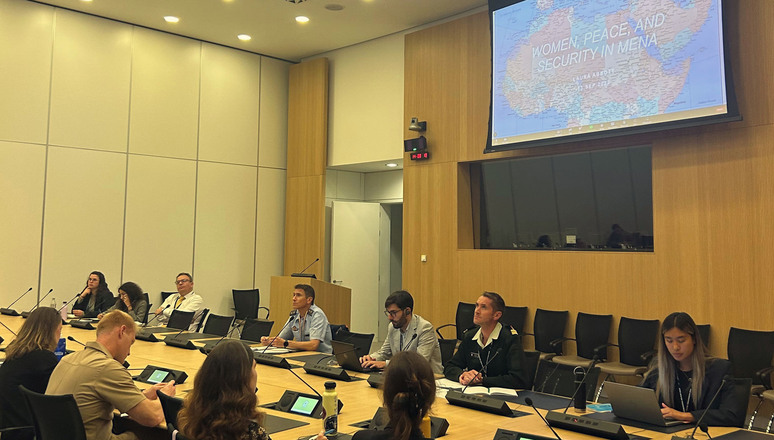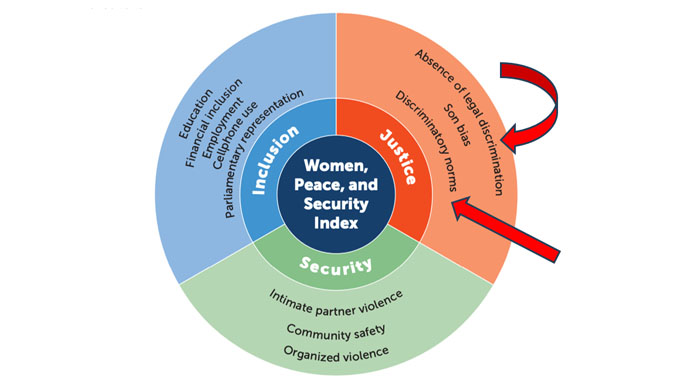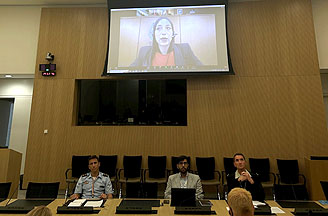To mark the upcoming 23rd anniversary of United Nations Security Council Resolution 1325, the NATO International Military Staff Office of the Gender Advisor (IMS GENAD) has launched a new series of deep dives focusing on the Gender Perspective in different geographical regions. On 13 September 2023, the first session of this series was held with a focus on the Middle East and North Africa (MENA) region. It explored where and how the Women, Peace and Security (WPS) agenda is prevalent among military and peacekeeping forces in the region, as well as the challenges that remain on its way. The discussion further examined what NATO is doing and can do in the future to support a comprehensive Gender Perspective in the region, highlighting specific best practices learned from different national contexts.

Subject matter expertise was provided by Major Laura Abbott (PhD candidate, John Hopkins University), Ms Assal Mahmoud, Programme Associate for WPS at the Cairo International Centre for Conflict Resolution, Peacekeeping and Peacebuilding (CCCPA), and Colonel Bertrand Peytavin, Action Officer for the South Section, Cooperative Security Division at NATO.
Gender Perspective in the Military: Lessons from Jordan
Major Abbott opened the session by cautioning against treating MENA as a monolithic region. She emphasised the importance of assessing each context on a case-by-case basis, due to the many underlying differences in characteristics such as language, religion, regime type, and post-colonial history. She introduced the Georgetown WPS Index to show how MENA countries rank on women's inclusion in comparison to the rest of the world. Major Abbott explained the phenomenon come to be known as the 'MENA Paradox', whereby despite rapidly rising female educational attainment and the closing if not reversal of the gender gap in education in MENA countries, female workforce participation rates remain low and stagnant - with female youth unemployment at 31.6% compared to 18% for men. This paradox has prompted various MENA militaries to consider greater recruitment of women for officer and non-commissioned officer posts.

Major Abbott further discussed the visibility of women in MENA militaries, underlining that, while remaining the minority, gradual progress is detectable - mostly driven by the growing spectrum of needs in the military, such as counterterrorism and intelligence. Jordan has made concerted efforts and progress in increasing the number of women serving in their armed forces. National reputation and leadership are also important in supporting this shift since they serve as change agents and role models.
Major Abbott noted that greater female engagement enables the military to operate more effectively within its cultural context, particularly in counterterrorism, border security, military intelligence, peacekeeping missions, response to humanitarian crises, and military policing. In addition, it broadens the diversity of thought, which results in the incorporation of fresh ideas, improved safety for all social groups, and overall better policy, each of which contribute to increased military legitimacy. She examined how the military can assist supporting the WPS agenda, including women's participation in peacekeeping, the prevention of conflict-related sexual violence, and the protection of women and girls in armed conflict.
Women serving in the military in MENA countries however still face significant cultural barriers, admitted Major Abbott. By referencing the Georgetown WPS Index to show public opinion in the region concerning women's workforce inclusion, she showed that a significant portion of the population do not support women from their family seeking outside employment. In Iraq, 53% of those polled objected, compared to 18% in the United Arab Emirates. Concluding her intervention, Major Abbott emphasised the power of National Action Plans to effect systemic change moving forward. This must however come in parallel with improved self-reflection, modelling, meaningful participation, ideas exchange, and talent management, she stressed - clarifying how an increase in the number of women in the military does not necessarily guarantee gender equality nor inclusion.
Gender Perspective in Peacekeeping: Lessons from Egypt
Speaking next, Ms. Mahmoud offered an outline of the major global changes raising questions regarding the application of the Gender Perspective. For instance, a crisis in trust has resulted in the global retreat of and existential threats to peacekeeping. In this context, the Gender Perspective can help to re-establish trust by strengthening the accountability and legitimacy of peacekeeping missions, allowing them to better meet the needs of their diverse constituents. She noted that this is especially important for MENA peacekeeping missions, because the region's peace and security challenges are highly gendered. This holds especially true when looking at terrorism trends and experiences of forced displacement in the region.
Given these challenges, Ms. Mahmoud advocated for WPS agenda to be at the centre of peace and security interventions. The Gender Perspective is key for constructing inclusive, context-specific, and sustainable responses. Ms. Mahmoud also highlighted how CCCPA contributes to this effort by building the capacities of key stakeholders to incorporate the Gender Perspective into peace and security programming. She noted Egypt as an example of how gender modules in pre-deployment trainings has enabled personnel to improve their cultural sensitivity and respond to the differentiated needs on the ground, crucially supporting the mission in fulfilling its protection of civilians mandate.
The increase in female participation in Egyptian peacekeeping missions also reflects an ongoing shift in public understanding of the value of women's engagement within peace processes. In September 2022, CCCPA trained the first batch of Egyptian female military contingents to be deployed in UN peacekeeping operations. It provided female peacekeepers with the opportunity to take on a wider range of roles, marking a milestone in Egypt's contribution to peacekeeping and its overall efforts to advance the Women, Peace, and Security agenda. Ms. Mahmoud concluded her remarks by emphasising how these experiences demonstrate that WPS and inclusive peace and security interventions are mutually reinforcing.
NATO's Partnership Tools and the Gender Perspective

Taking the floor last, Colonel Peytavin discussed NATO's approach to practical cooperation and partnerships in the MENA region and highlighted how NATO concretely strives to integrate the Gender Perspective into these partnerships. Describing the various cooperation methods and procedures used by the Alliance to develop its relationship with partners in the region, he emphasised interoperability, capability development, and support for defence and security-related reforms. This includes the use of partnership guidance frameworks that translate broad policy into more detailed cooperation objectives. The creation of tailored frameworks for each individual partner relies on NATO's recognition that specific partnership objectives are needed to aptly address context-specific needs. Several partners in the MENA region have integrated the Gender Perspective in their NATO partnership framework and in 2022, four MENA countries participated in nine gender-related events.
Colonel Peytavin closed his remarks by emphasising that gender may still be regarded as a non-military matter to some of NATO partners. Therefore, it is NATO's responsibility to advise them on incorporating the gender perspective into all aspects of cooperation, wherever applicable. In other words, the gender perspective should be part of a cross-cutting interoperability enabler as well as a single area of cooperation.
A Q&A discussion brought the Deep Dive session to closure. The first question addressed how to better encourage women to pursue careers in the military domain. The speakers highlighted the importance of mentorship, modelling, education, and skills training - including, in particular, language learning. They also noted how fostering greater awareness about these opportunities amongst women in the first place is another major point. One final question centred on what more NATO can do to further advance the WPS agenda in the MENA region. The speakers pointed to a critical need for capacity building on the WPS agenda as a whole as well as on the ways it can be integrated into peace and security planning and implementation. NATO can provide unique assistance by investing in capacity building customised to different national contexts and their implementation capabilities.
Significant progress has been made towards the WPS agenda in the MENA region, with Jordan and Egypt demonstrating increased female recruitment as well as incorporation of the Gender Perspective throughout different areas of the military. At the same time, however, barriers remain, and the region continues to face gendered peace and security challenges. Integrating the Gender Perspective can improve NATO's understanding of, and response to, the persistent and volatile strategic challenges affecting the Middle East and North Africa, including by informing better-tailored capacity building initiatives and increased knowledge sharing with partners.






